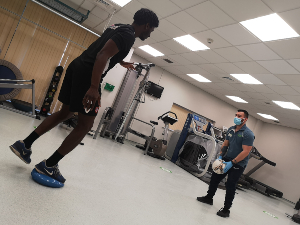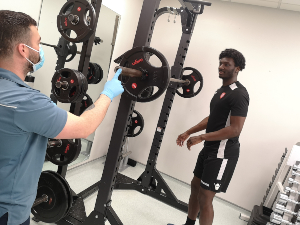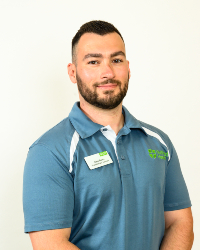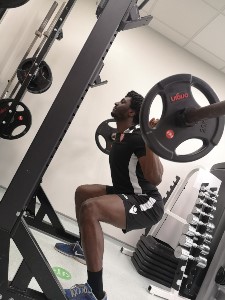Football player fighting fit thanks to multi-practitioner rehabilitation programme.
When we go into hospital for surgery, the last thing we want to worry about is how post-operative rehabilitation is going to get us fit and well again.
What is offered, isn’t just normal physiotherapy, it is a unique offering from a team of ten senior physiotherapists all with different specialisms, who apply their knowledge to meet the specific needs of the patient.

This is what Isaac Assenso needed. As a semi-professional footballer for Scarborough Athletic, Isaac came to Nuffield Health Leeds Hospital last September for anterior cruciate ligament (ACL) surgery.
The ACL connects your thigh bone to the shinbone and helps keep your knee stable. For a footballer, if damage is done to an ACL, it can be bad news. Thanks to the service we are able to offer our patients, Isaac should be back on the field taking Scarborough Athletic to success by the autumn.
“I wanted to get back to playing again as soon as possible. But with lockdown I could not get to a gym. I’m really grateful for the recovery programme offered by Nuffield Health Leeds Hospital.
“I was also able to work with a qualified personal trainer (PT), part of the Nuffield’s rehab team, which was brilliant,” Isaac said. Following Isaac’s surgery, he was still able to attend regular outpatient appointments with our physiotherapy team.
During the lockdowns, patients have been able to attend medical healthcare appointments, such as physiotherapy, as it is an essential element of achieving a successful outcome from many surgeries. In the current climate, this is done in a Covid secure environment, where practices such as social distancing and the wearing of protective equipment are undertaken.

“For our-post op patients, when appropriate, we offer one-to-one sessions with our Personal Trainer as part of their rehab and recovery so we can try and get them back to the level they really want to be at quickly,” Dan Garbutt says.
“Our PT is familiar with all the operations carried out here and works very closely with the physio team. He can also check in with the consultant, which means it’s a joined-up approach that runs smoothly for the patient. Not many other outpatient departments have this coordinated approach."
Dave Bown, our on-site Personal Trainer and physiotherapy assistant says it all comes together so well: “I can work with a patient and get them back to where they need to be. They set their goals. I also have access to several calling points within the department. Often, a physiotherapist will let me know if a patient is struggling and we discuss ideas on how we might do something differently. Or I might be asked to focus on a patient’s particular muscle group and work out a programme over a month.”

This is what led to a good outcome for Isaac.
“When Isaac started on my programme earlier this year he was in a brace as had poor extension and swelling, plus his quads were weak. It is fair to say he was struggling a bit, which is quite common in patients who have had ACL surgery.
“Isaac‘s football team didn’t really have the rehab structure of a big club. He didn’t have gym equipment at home and due to lockdown, no access to a gym. But we were able to help with Isaac’s rehab.
“I immediately set to work on building up his strength and working on stability. It was also a case of building his confidence, working on compound lifts, such as squats and deadlifts gradually increasing the barbell weight.
“We then progressed to single leg balance work with a football. This consists of Isaac standing on one leg and me throwing him a ball and Isaac passing it back remaining stable one leg. This tested the stability on his knee and quads, allowing him to progress to the next level,” PT Dave Bown said.
The good news for Isaac is that depending on his consultant’s assessment he should be ready after nine months (June) to start contact training and then one year post-surgery, be confident to get back to playing in September.
All post-rehab physiotherapy is open to anyone who has come to the hospital either through self-pay or fully funded via their insurance company, who also get access to our Recovery Plus scheme.
This includes a free, 3-month membership of any Nuffield Health gym of their choice (lockdown allowing) and this is coupled with a personalised recovery programme from your own recovery coach. With lockdown and gym closures, patients haven’t been able to access our gym network, but thanks to our onsite physiotherapy gym and Dave our Personal Trainer, patients haven’t missed out on this specialised rehabilitation.

“The impact of our scheme is really beneficial for an individual. With this dedicated programme, we can typically get people back to doing the activities they love doing quickly.
“From a wellbeing perspective that is great for physical and mental health.
“Having all these options open to us means we’re optimising patient recovery times, ensuring they are getting back to some form of normality as soon as possible. It is not necessary speeding up patient’s recovery, it’s that we are able to progress their rehabilitation as quickly as healing times allow, ensuring an optimal return to full training” Dan Garbutt said.
Read more about physiotherapy and rehabilitation at Nuffield Health Leeds Hospital
